It’s November. That means it’s time for October’s outstanding pastels! Every month I gather pastel paintings that catch my eye then at the beginning of the month I choose ten outstanding pastels to share with you. These choices are very subjective and I attempt here to explain many of the aspects of a work that caught my attention.
So let’s go have a look!

There’s no doubt that light is the subject here! The painting is flooded with it. I am reminded of the work of the Hudson River School particularly that by Thomas Cole and Albert Bierstadt. These artists believed nature, in the form of the American landscape, was a manifestation of God. And this is the feeling I get when I look at this piece, that it’s a revelation of the divine. One might also think of paintings by Turner where the light radiates off the canvas for instance in “Margate From The Sea.” This painting is small but has the impression of size associated with the painters mentioned above.
The simple palette of warm yellow oranges with tinges of complementary blue violet glows throughout the piece. Large simple shapes of land and sky focus our attention on the small variations of colour. Distant structures are backlit with a line of light that acts like a bolt of electricity across the piece. Swipes of pastel vertically give the feeling of light raining down over the landscape. No area is very distinct as light flows over everything and blinds us. The dark foreground both grounds us – giving us a place to stand and view the magnificence – and at the same time includes us in the picture. This device known as ‘repoussoir’ increases the illusion of depth and helps the viewer become part of the scene.
You can see more of Kathryn Millard’s work here.

From the vast landscape, we come to this severely cropped portrait by Justin Maas. All the focus is given over to the elements of the face – eyes, nose, mouth, and the spaces holding them together. The piece has a very sculptural feel with each element clearly carved out by light and shadow to convince us of a three-dimensional form. We see the planes of the face clearly yet there are more soft transitions than you might expect. The whole is molded rather than chiselled.
The uncomplicated complementary palette of oranges against a blue background helps focus our attention completely on the face. There are no clues or decorative ornamentation of jewellery or dress to distract us. Also, although the head is set off-centre, the tip of the nose is dead centre. Everything seems so perfect and yet a few loose and out-of-place hairs speak to a reality not so evident in this flawless specimen of young woman. Looking more closely and we also spy a slight sheen of perspiration on her chin, cheek, and upper lip. This reveals some discomfort whether it’s the physicality of posing under hot lights or a revelation of an uncomfortable emotional situation. What are those outward-looking bright and intelligent eyes saying to us? With her direct look, we cannot help but be fully engaged with this young woman.
You can see more of Maas’s work on his website.

Another portrait but one with a different feeling from the painting above. Here the light is softer and cooler without the direct spotlighting of the previous piece. The eyes of this young woman don’t look directly at us. They could be watching the artist as he paints her or looking at something beyond. There is a distinct sense of her being present rather than drifting in her own reverie. Looking at her lips, it appears that they are about to part, to express some thought to the off-stage person.
Without the sculpting effect of direct light, this portrait with its soft muted browns is more about the shapes created by hair, face, dress, chair and shoulders than an expression of three-dimensional form. The artist lovingly traces the edge of the model’s uncontrolled tresses against the cool solid-coloured background keeping the contour soft as the hair creates a dark and uneven frame around the face. The piece is fairly dark except for the light background and the unexpected but delightful shape of pink on the lower right.
The figure leans back away from us. The shoulder on the right is raised awkwardly which adds a sort of tension to the piece. And is her brow about to crease with a question or unease? What is going on here?
Sadly, I was unable to find a place online to direct you to see more of Edward Stephen Robitz Jr’s work.

A belt. An item that has the function of keeping one’s trousers secure, and can also be a decorative and finishing accessory. Yet many may recall from their childhood, a more sinister use of the belt particularly a man’s belt. You can look at this painting and see a simple still life or you can read deeper meanings into it. We all bring our own story and perspective to a piece of art, sometimes enlarging the idea even beyond the artists’s intent.
A simple idea for a still life but perhaps not so simple to render. Silja Støvring observes carefully, and beautifully renders the belt. She includes enough detail for us to see, for instance, the slight reflection of light reflected up from the cloth onto the shiny side of the belt, yet keeps it loose enough to lose edges along the way that in turn helps the belt sit in space.
The burnished outer side of the belt with its cool leaning contrasts beautifully with the velvety warm-coloured inside. We can feel the distinct texture of both sides of the leather. Our eyes, starting on the far left, follow the spiral of the belt out to the belt buckle. The cast shadow returns us to the belt where we rewind our journey back to the start. Above the belt, dark pastel rolls in like a fog, darkness that perhaps hides a dirty secret. The painting moves from dark to light where the belt sits, exposed.
Check out more of this artist’s work on her website.

In this painting, Charlie Pate celebrates a lowly and often invasive weed. Queen Anne’s Lace is elevated to cut-flower status and put in the spotlight (physically and metaphorically) for all to see and enjoy. The flowers, lit by a cool exterior light, are set against a warm background. The artist gives all his attention to the detailing of the plants – stalks, leaves, blooms – while leaving the cabinet behind them undefined and unfinished. He teases us with suggestions of what the cabinet holds by creating various shapes behind the glass doors. But there’s only enough information for us to guess from our own experience of such furniture and what it might hold.
There’s a romantic quality about this piece: in the quality of gentle light; in the contrast of soft and pliable nature against the rigid hard lines created by man; in the idea of nature’s wildness; in the coziness of a warm library; in the painting’s glorification of nature.
The vase with its bouquet is front and centre yet it doesn’t stop our eyes from travelling the picture and exploring the roughed-in shapes behind. We then return to the vase and the subtly expressed table returning once again to the greenery. Another painting with a simple complementary palette of mainly greens and reds that moves through the full value spectrum of dark to light.
See more of Charlie Pate’s work here.

There’s just something so easily appealing about this painting of a dog swimming. You can feel the artist’s love of these animals and also the delight in creating the almost monochromatic pattern of swirls and dips and waves of water. Much of what we see is either a reflection of the sky (the grey blue areas) or the sand that lies below the water. In this way Emma Colbert paints both the translucency and transparency of water. The only deviation from this description of water are the dog and its cast shadow. Fur both wet and dry are detailed and this contrasts with the large and simple shape cast by the dog which is left unmarked by the designs created by the swirls of water. This mostly middle value painting is punctuated only by a few dark and light shapes on the dog itself.
The only other notes of difference are the sparkle of water as the dog makes its way forward, and the foam ahead. These foam bits create a subtle barrier to keep us in the picture – remove them and we swim beyond the boundary with the dog. They sort of push back against the dog’s movement.
This is a portrait of nature – of water and animal. It’s also a portrait of love, a dog’s adoration of its human and the human’s return of love. If one was cynical, one could also read the picture as the controlling and dominating hand of humankind over their animals, revealed in the hard black curve of the handle on the vest encircling the dog’s body. Again, this is a great example of how we bring our own beliefs and ideas to paintings.
See more of Colbert’s work on her website.

Here’s another piece made up of the patterns in the water, this time created by the motion of swimming fish that circle and dash. The whole painting is almost a decorative design and yet it doesn’t stay still – it’s full of movement emphasized by the diagonal line running top right to bottom left. Once again we have a careful observation of a body of water and how it’s affected by colours and light. This time it’s fish that break the stillness – it’s their passage that creates the swirls and amorphous shapes on the surface. Objects beyond the water, possibly trees, are reflected in the water in a vague way but the pattern they create is disturbed by the fish. The sky is also reflected and reveals a grey day which happily is brightened by the intense colours of the koi.
The primary palette is one of muted blues and greens. The almost monochromatic look is enlivened by the pure warm dabs of reds and oranges scattered through the piece. These may appear random, but they precisely lead our eye through the piece. Starting in the dark patterns at the top left of the piece, we encounter the first fish which link us to other fish and so we zigzag our way down through the painting, ending in the light at bottom left. The mass of three fish and the circular lines above them pull us upward to be reunited with the vertical reflections at the top.
The fish are an excuse to play with abstract shapes and swirling lines, to use strokes of pastel to recreate an abstracted reality of water and koi. To see more of Eileen Casey’s work, click here.

One egg sits on a shelf or ledge, somehow defying the possibility of rolling forward towards us and off the edge. There’s a sense of it being contained in a box – a nest box? A collector’s box? What kind of egg is this? It could be your everyday garden variety unfertilized egg – crack it open and have a fried egg for breakfast. Or could it be an egg, just laid, awaiting siblings and eventual hatching? Or perhaps a rare egg from a far off bird that has been collected and preserved for posterity in a museum. We have a shape that’s familiar to us but nothing by which to intuit its size unless of course we take the egg to be life size. We could also read this as a metaphorical egg perhaps representing unborn possibilities and ideas waiting to be incubated. What story does this picture have to tell you?
Or is the egg just an excuse for a painting about the pastel medium? Bill Creevy is a master of pushing and pulling pastel in a full exploratory way. The pastel is applied thickly in parts, thinly is others, in blurred swipes and linear hatching. The texture is palpable – even on the computer screen it jumps out into our three-dimensional world. The surface quality with its dense application of pastel and the pitted and scarred look bring to mind the wall paintings of Pompeii.
Without the egg and the shelf supporting it, we are left with abstract forms and lines with the mark of the pastel of primary importance. The marks are in no way hidden – they are the reason this painting exists. A horizontal line that runs across the centre brings us out of illusionary space and onto the surface of the painting. On the other hand, the dark spot behind the egg entices us into the depths beyond, into a kind of hidden eternal space.
Check out more of Creevy’s work on his website.

At first glance, we’re looking at the doorways and a window of a stone building – a farmhouse perhaps. At first glance there’s a solidity about the building. Then perhaps you notice the root writhing from the doorframe or maybe you suddenly comprehend that the upper stones are floating off the foundation. Or perhaps it’s the sudden realization that the slats of wood in the righthand door are unconnected to anything. No matter how, unexpectedly you’re aware that this isn’t a rendering of a stone dwelling at all but an exploding illusion of one. We see blue and suspect we could be looking up at blue sky or into water, looking up at the surface where the light glows above.
What is this fantasy where nothing is as it first appears? The fantasy is furthered by the cast shadow that falls diagonally through the painting. All well and good except there’s nothing to cast the shadow! To me this painting reminds us to look closely at a painting. A quick glimpse and we see a building; stay with the art and the truth is more readily seen.
The painting’s pure blues and greens are balanced by the earthy warm red browns. Stay longer and explore the almost unpenetrable darkness below. The blues above are equally mysterious. Look deeply into both and you may find yourself discovering planets and galaxies. It seems to me this painting also shows us how much there is behind the concreteness of our thinking and our perception of the solidity of the visible world.
See more of Sylvain Loisant’s work here.

Before we even realize what we’re looking at, we see shapes of pure saturated colour created with energetic gestural hatching. There’s no holding back here! The dense texture of mark-making appears almost tapestry-like. The left third of the painting is dark with the rest of mid-value except for lightest part (the light shine from the headlights) that abuts the darkest part (the car). A mass of cool colours are offset by the warm shapes of red. The underlying structure is a large ‘X. Curving lines direct us through the painting left to right. Subtly another curve emerges, crossing through the more horizontal curve, created by the outer edges of the headlights. It softens the more obvious diagonal of the crosswalk.
Cars drive around a curve in the inkiness of night. The car on the left approaches a crosswalk, lit up in the arc of its headlights. Stare at the white light long enough, and we are blinded, unable to see beyond into the darkness. But as we move our eyes away from the brightness, we can see colours within the dark. And not only that, spend more time with the piece and you discover a figure about to walk out of the painting lower left. So had the car on the left stopped for the pedestrian or had the person crossed in front of the other car, now well underway?
This abstraction of reality takes us on a thrill ride through colour – pure and intense – and bold dynamic mark-making. See more of Gigi Liverant’s work here.
~~~~~
That’s it for another round-up of outstanding pastels! I would love to hear your thoughts about these pieces and/or my words about them. Were you inspired by October’s outstanding pastels?? Please leave a comment 🙂
Until next time,
~ Gail










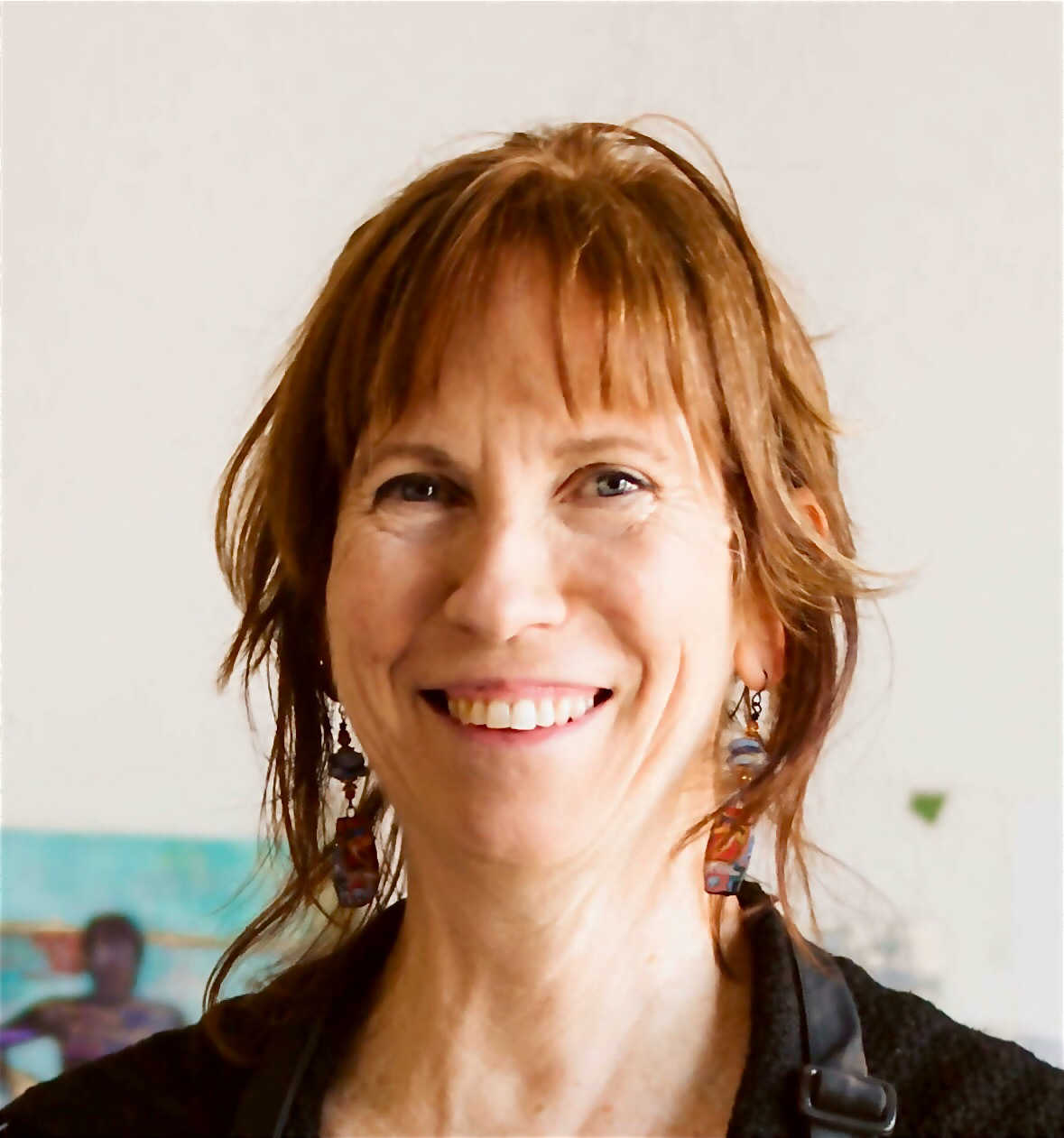

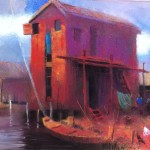
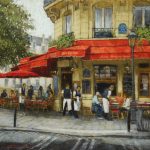
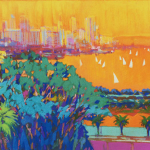


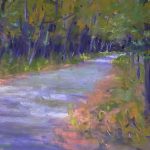
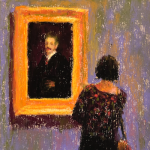
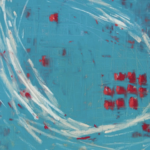
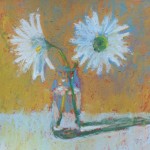


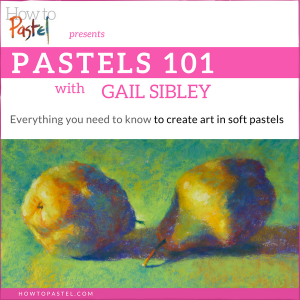

30 thoughts on “October’s Outstanding Pastels To Inspire You!”
Thank you so much, Gail, for featuring my painting! I`m greatly honored to be among the exquisite company you`ve picked. No one before (during the 35 years I`ve been painting) has bothered to give me such a detailed analyze of a single artwork as you do here. I have so much to learn from you! Hope you keep on the fabulous work of painting, blogging and teaching!
You are so welcome!! It was difficult to pick from all your wonderful 31 in 31 challenge paintings but there was so much about this piece that I liked. And I hope to continue blogging, painting, and teaching for many years to come!
OMG, Gail. Maybe because it’s morning and the day hasn’t taken its toll on me yet, but all of these paintings and your descriptions of them moved me beyond belief! Great picks!! Already looking forward to next month’s!
Elaine, thank you for such an enthusiastic response to this blog. You know how long they take me to do so I need all the motivation I can get!
Oh! Wow, a delightful mix of images Gail. Bill Creevys Egg has stolen my heart. I’m green with envy at his talent, technique and vision!!! I’m a figurative painter/ fashion inspired but in my heart I have a wee longing to work like him! I’ll just have to DO IT! Give it a whirl. Thank you for inspiring me today.
Patricia, from Ireland.
Thanks so much Patricia! I’m delighted to have started your day with inspiration particularly with Bill Creevy’s egg. And yes, just get in there and do it. And most of all, don’t judge anything you do in these explorations harshly!!
WOW! These were all wonderful, Gail. I’m so glad you’re faithful to your monthly search-and-share! I certainly recognized the belt and remember Silja’s story…indeed not all belt memories are happy ones.
Glad you like them Wendy. It’s comments like yours that keep me collecting and writing this monthly feature!
My favorites of these are “Lacey” and “Ferme Celeste.” The portrait is stunning. I love the mix of reality and abstract in “Ferme Celeste.”
Celeste thanks so much for letting us know your favs. It’s something isn’t it when a painting keeps calling you to come look again.
Hello Gail,
This is my first day on here and all I can say is WOW! I’m fairly new to pastels. Only about 2 years but your website is so inspiring. It makes me want to go sit at the easel right now. I have so much to learn and so happy to be here with you.
Tracey Bowman
Wow first day and you were inspired to write a comment – that makes me feel sooooooo good Tracey! And what makes me even more happy is that the post made you want to go paint right now. That’s awesome!!
Gail,
I truly cannot say which is more inspiring … the paintings you’ve selected or your thoughtful, in depth analysis. Thank you for taking the time.
Thank you for such a lovely comment Cosette! I’m so glad you enjoyed both. 🙂
Gail,
This month’s picks make it so difficult to choose a favorite. Emma and Silja, you already know I’m a fan. For me this month belongs to Bill Creevy’s wonderful atmospheric painting, “Egg Chamber”.
Congratulations to all the outstanding artists featured this month and to Gail for her wonderful comments about each of the works she chose.
Thanks, Gailen
Thanks so much Gailen. I’m glad you are as taken with Bill’s “Egg Chamber” as I was. Every time I look at, I can feel its pull!
Looking at Edward’s portrait painting “Lacey”, two phrases come to mind: The eyes have it, and the eyes are the window to soul. No matter where one focuses on this well executed painting, the eyes draws you . Good choice Gail; well done.
Oh Cliff, you have that right!! Thanks so much for adding to the discussion around this painting.
Great collection of pastels again. Favourites? Bill Creevy’s egg, for sure; I have his pastel book and can’t put it down, there’s so much to enjoy about his techniques….and I’m fascinated by those last two…, the three mysterious doors—unreal, creepy, a bit enigmatic….and Rotary is quite unique, fab hatching technique and great use of abstract shapes for the road markings!
Thanks Chris! Bill Creevy’s book is a classic. If ever I need some inspiration, I reach for his book! And so of course his Egg – so wonderful. And about those doors, it is a bit creepy isn’t it. Love that you brought that description into play. Glad you like Rotary too – such bold colour and big shapes.
I have seen almost all of these paintings and reading you thoughts on them are so informative and interesting. Thank you!
Thanks Sharon! I’m glad that reading my notes on the paintings added something to your viewing of the paintings.
What a wonderful selection of pastels this month and your observations about them are so astute. There are several here that have stayed with me since I first saw them, The Belt is one of them and The Egg. One of my favorites is Dogged Determination. It could be because I have a Border Collie in my life as well and am well acquainted with their special brand of determination and it is such a lovely painting. Thank you!
Yay Janette! Thanks for sharing your favs with us. “Dogged Determination’ shows just that doesn’t it?! I’m delighted some of these paintings have stuck with you – certainly the mark of something special.
Wow. My first time seeing these…and your analytical comments are very thoughtful. Your selections show the breadth and scope of possibilities in pastel…something that really helps someone like me, not a rank beginner but also not yet a mature artist ( although certainly so in chronological years!). Thanks so much for this and all on your website.
Paula I’m happy that these choices help show you the possibilities with pastel! It’s quite amazing what artists can do with it, how they use the medium to express, in a unique way, their take on the world.
So impressed with your choices. Several were my favorites as well. Thanks for the excellent comments also.
Glad you found much that aligned with your own favourites and that you appreciated my comments on them Anne!
Sorry for the long delayed response, but this link was forwarded to me only today. It’s so encouraging to hear that you enjoyed my painting of Lacey. Thank you for your posting and kind comments. They’re much appreciated.
Thanks so much for commenting Ed. I’m glad to hear you enjoyed what I had to say. Beautiful piece! Do you have a website where I can direct readers to see more of your work?